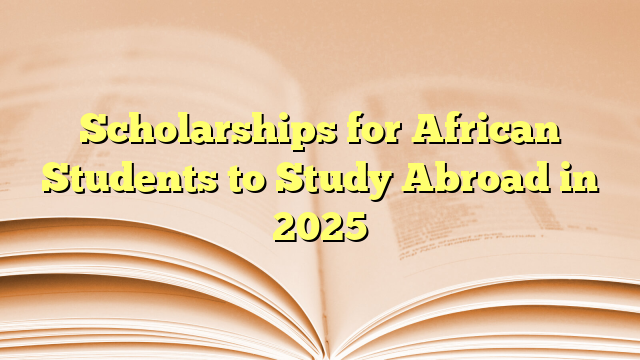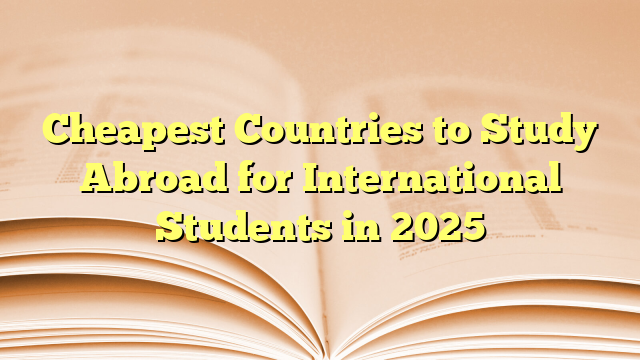African students are increasingly seeking international education to access world-class academic environments, research opportunities, and broader career prospects. However, the high cost of studying abroad remains a significant barrier. To bridge this gap, numerous scholarships are specifically designed to support African students at undergraduate, master’s, and PhD levels. These scholarships not only cover tuition but often include travel, living allowances, and health insurance. This article provides a comprehensive guide to the best scholarships for African students in 2025, how to apply, eligibility criteria, and tips to maximize your chances of selection.
Why Scholarships for African Students Matter
Education is a powerful tool for transforming individuals and communities. Scholarships help:
- Provide access to quality education that may not be available locally
- Reduce the financial burden of studying overseas
- Foster global leadership, innovation, and cross-cultural exchange
- Support sustainable development by empowering future professionals and leaders
Many global institutions, governments, and foundations recognize the potential in African youth and invest heavily in scholarships targeting this region.
Top Scholarships for African Students in 2025
Mastercard Foundation Scholars Program
This flagship program partners with top universities in Africa, North America, and Europe.
Level: Undergraduate and Master’s
Host Institutions: University of Edinburgh, University of Toronto, Sciences Po, AUB, African universities
Coverage: Tuition, accommodation, books, travel, monthly stipend
Eligibility: Academically talented but economically disadvantaged African students
Deadline: Varies by institution (typically October–January)
DAAD In-Country/In-Region Scholarships
Funded by the German government for African students to study in Africa or Germany.
Level: Master’s and PhD
Coverage: Tuition, travel, stipend, insurance, research support
Eligibility: Must be from Sub-Saharan Africa and accepted at an eligible host university
Deadline: March–August depending on region
Chevening Scholarships – UK
Sponsored by the UK government for future leaders from across the globe.
Level: Master’s
Coverage: Full tuition, travel, visa fees, monthly allowance
Eligibility: At least two years of work experience, leadership qualities, and a strong academic background
Deadline: November
Commonwealth Scholarships
Targeted at students from Commonwealth countries including many African nations.
Level: Master’s and PhD
Coverage: Tuition, airfare, living allowance, thesis grant
Eligibility: Must be a citizen of a Commonwealth country with academic excellence
Deadline: October–December
African Union Scholarships
Offered through the Pan African University and other AU initiatives.
Level: Master’s and PhD
Coverage: Full scholarship, travel allowance, and stipends
Eligibility: African nationals under age 35 (Master’s) or 40 (PhD), with relevant degrees
Deadline: June
Fulbright Foreign Student Program – USA
One of the most well-known U.S. government-funded scholarships.
Level: Master’s and PhD
Coverage: Tuition, travel, health insurance, monthly stipend
Eligibility: African citizens with strong academic performance and leadership skills
Deadline: February–May (varies by country)
Eiffel Excellence Scholarship – France
Offered by the French Ministry of Europe and Foreign Affairs to attract top students.
Level: Master’s and PhD
Coverage: Monthly allowance, travel, insurance, but not tuition
Eligibility: Applicants from developing countries under 25 (Master’s) or 30 (PhD)
Deadline: January (via French institutions)
ADB-Japan Scholarship Program
Jointly funded by the Asian Development Bank and Japan.
Level: Master’s
Host Institutions: In Asia and the Pacific (Japan, Hong Kong, India, etc.)
Coverage: Tuition, living expenses, travel, medical insurance
Eligibility: African nationals from ADB borrowing member countries
Deadline: March–April
Mo Ibrahim Foundation Scholarships
Designed to support governance and leadership education for African students.
Level: Master’s
Host Universities: University of Birmingham, London Business School
Coverage: Full tuition, living costs, internship opportunity
Eligibility: African nationals with interest in leadership and governance
Deadline: March–April
Chinese Government Scholarships (CSC)
China is rapidly expanding its educational diplomacy with Africa.
Level: Undergraduate, Master’s, PhD
Coverage: Full tuition, accommodation, monthly stipend, medical insurance
Eligibility: African students with academic merit
Deadline: March–April
Fields of Study in High Demand
Scholarships often favor applicants in fields critical to development and innovation, such as:
- Public Health
- Education
- Engineering and Technology
- Climate and Environmental Sciences
- Agriculture and Food Security
- Peace and Conflict Studies
- Business and Public Policy
- Information and Communication Technology (ICT)
How to Apply for Scholarships as an African Student
1. Identify Scholarships that Fit Your Background
Start by researching scholarships based on your nationality, degree level, and field of interest. Use platforms like:
- www.scholarshipsads.com
- www.opportunitiesforafricans.com
- www.daad.de
- www.chevening.org
- University financial aid websites
2. Prepare Your Documents
Standard documents include:
- Academic transcripts and certificates
- National ID or passport
- Personal statement or motivation letter
- Curriculum Vitae (CV)
- Letters of recommendation
- Proof of English or French proficiency (IELTS, TOEFL, DELF)
- Research proposal (for PhD applicants)
3. Tailor Each Application
Customize each application to the scholarship’s mission and values. Highlight leadership, community service, academic excellence, and how your goals align with the scholarship’s objectives.
4. Apply Before the Deadline
Most programs open between August and January. Submit your applications early to avoid disqualification.
5. Prepare for Interviews
Some scholarships, especially those with leadership components (Chevening, Mo Ibrahim), require interviews. Practice communicating your goals, strengths, and what makes you a unique candidate.
Tips to Win Competitive Scholarships
- Apply to multiple programs; don’t put all your hopes in one application
- Focus on impact—how will your education help your country or community?
- Ensure your essays are well-written, personal, and concise
- Choose referees who can vouch for your potential and character
- Stay organized by tracking deadlines in a spreadsheet
- Demonstrate leadership experience and commitment to development
- Be authentic—don’t exaggerate achievements or invent stories
Countries That Offer Most Scholarships to African Students
- United States: Fulbright, university-based scholarships
- United Kingdom: Chevening, Commonwealth, Mo Ibrahim
- Germany: DAAD, university programs
- France: Eiffel Scholarship, Campus France Africa-focused initiatives
- Canada: Vanier Scholarships, MasterCard Foundation, university grants
- China: CSC, Belt & Road scholarships
- South Africa: NRF, Mandela Rhodes Foundation
- Japan: MEXT, ABE Initiative
- Norway & Sweden: Government and university scholarships
FAQs
Can I apply if I don’t have excellent grades?
Some scholarships focus more on leadership, service, or financial need. However, academic merit is often a key criterion.
Do I need IELTS or TOEFL?
Many scholarships require English proficiency proof, but some accept MOI (medium of instruction) certificates or offer exemptions.
Can I apply for multiple scholarships?
Yes. It’s advisable to apply for as many as you qualify for.
Is work experience required?
Not always, but scholarships like Chevening or Commonwealth often require 1–2 years of relevant experience.
Are scholarships only for postgraduate study?
No. Some scholarships also support undergraduate study (e.g., MasterCard Foundation, CSC).
Final Thoughts
Scholarships are powerful tools that help African students unlock global academic and leadership opportunities. With numerous fully funded options in 2025, from the UK to China, Germany to the USA, aspiring students should begin preparing early, stay organized, and tell their stories with clarity and conviction. If you are driven, academically capable, and passionate about making an impact, a scholarship could be your gateway to a transformative international education.






